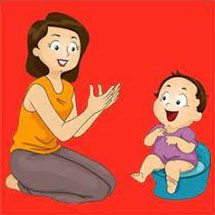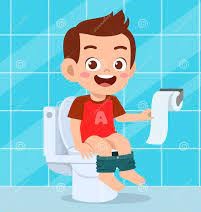Potty and toilet training
Potty and toilet training
Some children take to toilet training quickly, others take more time.
Either way, it's common to have questions and face setbacks as your child learns this new skill.
Find out more about:
- Potty training advice and information
- Information and support in York
- How to toilet train your child
- When you feel your child is ready
- Supporting your child to be dry during the night
- Helping your child poo in a toilet or potty
Potty training advice and information
See information from the NHS on how to potty train your child.
The Children's Bowel and Bladder charity, Eric, has a parent and children forum and a free helpline, as well as some useful information including:
Tiny happy people potty training tips contains lots of practical tips and tricks to help you get your child out of nappies and into pants. They have also gathered some of the most frequently asked questions about potty training and put them to ERIC, the children’s bowel and bladder charity, who have provided some tips and suggestions.
Information and support in York
In York, the Healthy Child Service can answer questions and provide support for potty or toilet training and can refer to professionals for further support if required.
The Healthy Child Service Continence service offer support to a child and their parents through the Bowel and Bladder Education Workshop, that are run by the child development and school nursing team.
If you have any questions or worries, you can call the Healthy Child Service on telephone: 01904 555475, Monday to Friday 9.00am to 4.30pm, or email: [email protected].
How to toilet train your child
Toilet training is something that worries many parents, but it doesn’t usually worry your child.

Here are some top tips to introduce early, to encourage toileting readiness:
- sit on the potty at nappy changes, after sleep or feeds, or if you notice signals from child
- change your child’s nappy in or near the bathroom
- change your child in the standing position
- show your child the contents of their nappy if the child has done a poo
- empty their poo in toilet, while they watch
- encourage your child to flush the toilet
Develop your child’s skills to help with toileting success:
- support your child to wash and dry their hands
- support them to dress and undress
- support your child to understand rewards and praise
- support your child to sit on the potty or toilet
- reading stories and using cue cards
- raise your child’s awareness by putting some kitchen roll in their nappy
- have an open door policy at home when using the toilet
- encourage your child to wipe their own bottom
- being consistent with names of “wee” and “poo”
- leave a potty somewhere your child has easy access to
When you feel your child is ready
Using a potty is a new skill for your child to learn. Most children are ready to use the potty or toilet between 2 and 2 and a half years old. It's best to take it slowly and go at your child's pace and taking their lead. Being patient with them will help them get it right, even if you sometimes feel frustrated.
Encourage your child to sit on the potty/toilet when they have woken up from a sleep and after meals, because digesting food often leads to an urge to do a poo. Having a book to look at or toys to play with can help distract your child to sit still on the potty.
If your child regularly does a poo at the same time each day, leave their nappy off and suggest that they sit on the potty.
As soon as you see that your child knows when they're going to have a wee, (they may become fidgety) encourage them to use their potty. If your child has an accident don’t make a fuss, clean up the mess and reassure your child.
Take your child to a potty or toilet every 1 and a half to 2 hours during the day.
Make sure your child is wearing clothes which are easy to take on and off to encourage independence.
Your child will be delighted when they succeed. Use lots of praise and a reward such as a sticker.
When your child is doing approximately 50% of their wees and poos on the potty or toilet stop using nappies during the day and use cotton pants.
Take your potty out with you, putting a nappy or pull up on your child, even for a short time will confuse your child, this will lead to less success.
Supporting your child to be dry during the night
Children do not learn how to be dry during the night the same way as they learn during the day. Most children become naturally dry during the night within a few months of potty/toilet training in the day. These tips can help you support your child to be dry during the night:
- make sure your child drinks plenty of water during the day
- stop food and drink an hour before bed
- encourage a final wee before bed
- take them to the potty or toilet during the night if they wake up but do not “lift” them to use the potty or toilet if they are asleep
- have a good bedtime routine
- try to avoid being constipated
Nighttime Wetting – A video guide for children, young people and families
This video is for you if you, or someone you know, is struggling to help your child stay dry at night. It's full of advice from both a paediatrician and specialist nurse on things you can do to try to achieve dry nights.
Bedwetting is very common, but it can be upsetting and exhausting for everyone. There are some simple strategies families can try at home and at school that can help support their child to become dry at night.
This video has been developed by a team of healthcare professionals to help families understand the possible causes of bedwetting as well as sharing some simple strategies families can try at home and school. It also provides advice on what to do if the family has tried the strategies and it's still an issue.
The guidance is suitable for all children and young people of any age, with advice that can be adapted for children and young people with physical or learning needs.
Remember, bedwetting is not the parent, carer or child's fault and there is lots of advice and support available.
Contact your GP if your child has:
- been dry at night and has started to wet the bed again
- wetting accidents during the day
- hard poos
- urine infections
Watch the video guide for children, young people and families.
Helping your child poo in a toilet or potty

It's very common for a child aged 2 to 4 years old to only want to pass a poo in their nappy. They may feel worried about using the toilet or potty or could be constipated due to holding their poo for a long period of time.
Building your child’s confidence to use the potty or toilet will help them over-come their worries:
- read stories to them about children using the toilet or potty
- have some special toys in the bathroom which can be used for distractions when your child is sitting on the toilet or potty
- encourage your child by using rewards such as stickers
- sit your child on the toilet or potty wearing a nappy to pass their poo
- stand your child next to the toilet as soon as they have done a poo to take their nappy off; encourage your child to empty the nappy into the toilet and flush the poo away
- ask your child to wash and dry their hands
When your child is showing more confidence and happily passing their poo on a toilet or potty, the next step would be to cut a hole in their nappy so your child has the comfort of the nappy but emptying their bowels through the hole into the toilet or potty.
With lots of praise and consistency your child will learn to poo in the toilet or potty.

